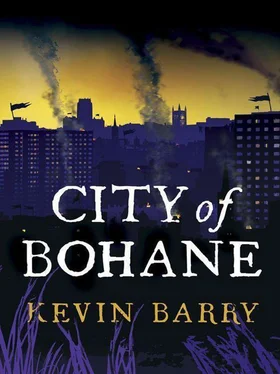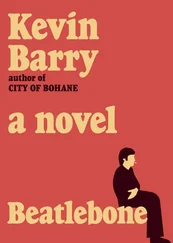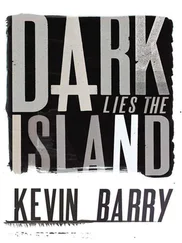Down along the boxcar, he saw the Authority man mouth a sadness through his sozzled half-sleep, most likely a woman’s name – was she as green and lazy-eyed as the Gant’s lost love? – and the city unpeeled, image by image, as the El train screeched along De Valera: a shuttered store, a war hero’s plinth, an advert for a gout cure, a gull so ghostly on a lamp post.
Morning was rising against the dim of the street lights and the lights cut just as the El screeched into its dockside terminus. The train locked onto its berth – the rubber jolt of the stoppers meant you were downtown, meant you were in Bohane proper – and the El’s diesel tang settled, and died.
He let the hoors and the drunk off ahead of him. The Gant as he disembarked was fleshy and hot-faced but there was no little grace to his big-man stride. A nice roll to his movement – ye sketchin’? The Gant had old-time style.
The station is named Bohane St Francis Xavier, officially, but everyone knows it as the Yella Hall. The Gant sniffed at the evil, undying air of the place as he walked through. Even at a little after six in the morning, the concourse was rudely alive and the throb of its noise was by the moment thickening. Amputee walnut sellers croaked their prices from tragic blankets on the scarred tile floors, their stumps so artfully displayed. The Bohane accent sounded everywhere: flat and harsh along the consonants, sing-song and soupy on the vowels, betimes vaguely Caribbean. An old man bothered a melodeon as he stood on an upturned orange crate and sang a lament for youth’s distant love. The crate was stamped Tangier – a route that was open yet – and the old dude had belters of lungs on him, was the Gant’s opinion, though he was teetering clearly on Eternity’s maw.
Choked back another tear did the Gant: he was big but soft, hard yet gentle.
The early edition of the Bohane Vindicator was in but the bundles had as yet to be unwrapped by the kiosk man, who listened, with his eyes closed, to an eerie sonata played on a transistor wireless – at this hour, on Bohane Free Radio, the selector tended towards the classical end of things, and towards melancholy. Nodded his head softly, the kiosk man, as the violins caught.
Oh we’d get medals for soulfulness out the tip end of the peninsula.
The Gant settled into the blur of faces as he passed through. The faces, the voices, the movement – all the signals were coming in clear. They told that he was home again; it was at once painful and beautiful. He looked for her in every woman he passed, in every girl. He bought a package of tabs off a lady of great vintage wrapped in green oilskins: Annie, a perpetual of the scene.
‘Three bob… tuppence?’ she said.
There seemed to be that question in it, for sure, as if she recognised him back there beyond the dead years.
‘Keep the change for me, darlin’,’ he said.
A hoarseness to his voice, emotional, and his accent was still quietly of the peninsula even after the long years away. Years of sadness, years of blood – this Gant had his intimate agonies. A snatch of a lost-time song came to him, and beneath his breath he shaped the words:
‘I was thinkin’ today of that beaut-i-ful land,
That I’ll see when the su-un goeth down…’
The hoors who had wept on the train were ahead of him now on the concourse. They had gathered themselves. They were painting on bravery from snap-clasp compacts as they walked. The hoors would be bound, he knew, for Smoketown, and its early-morning trade. The Gant watched as they went through the Yella Hall. Ah, look: the quick switching of their bony buttocks beneath the thin silk fabric of their rah-rah skirts, and the way their calves were so finely toned from half their young lives spent on six-inch spike heels. The sight of the girls made him sentimental. He had run stables of hoors himself as a young man. There was a day when it was the Gant had the runnings of Smoketown, a day when the Gant had the runnings of the city entire.
Was said in Bohane the Gant had run it clean.
He stopped for a shot of tarry joe by the main portal of the Yella Hall. It was served expertly by a midget from the back of a licensed joe wagon. He watched, rapt, as the midget tamped the grounds, twisted a fix on the old Gaggia, arranged a tiny white cup to catch the pour. The midget also was familiar – a squashed little brow, a boxer’s nose, oddly sensuous lips. Same midget’s father, the Gant would have sworn, had the licence on that chrome wagon before him. The generations tag so in Bohane. He drank the joe in one, and shivered. He thanked the midget, and paid him, and he let the coffee’s bitter kick arch his eyebrows as he looked out to the first of an October morning. The gulls were going loolah on the dockside stones.
Of course those gulls were never right. That is often said. The sheer derangement in their eyes, and the untranslatable evil of their cawing as they dive-bomb the streets. The gulls of Bohane are one ignorant pack of fuckers. He had missed them terribly. He laughed out loud as the gusts of morning wind flung the birds about the sky but he drew no looks – sure the Yella Hall would be crawling with wall-bangers at the best of times.
The Gant set out towards the Smoketown footbridge. He took a scrap of paper from his pocket and opened it. He read a hand that had not changed with the years – still those big, nervous, childish letters – and its scrawl spelt out these words:
Ho Pee Ching Oh-Kay Koffee Shoppe.
The Gant had a wee girl to meet at this place. It was a good time for such a meeting – he could be lost among the crowd. Smoketown, he knew, would be black at this hour of the morning. The late shifts from the slaughterhouses and the breweries were only now clocking off. Bohane builds sausages and Bohane builds beer. We exist in the high fifties of latitude, after all, the winters are fierce, and we need the inner fire that comes from a meat diet and voluminous drinking. The plants worked all angles of the clock, and after the night shift, it was the custom to make for S’town and a brief revel. In the dawn haze, the brewery lads were dreamy-eyed from hopsfume, while the slaughterhouse boys had been all the silver and shade of night up to their oxters in the corpses of beasts, filling the wagons for the butchers’ slabs at the arcade market in the Trace, and the wagons rolled out now across the greasy cobbles, and it was a gorey cargo they hauled:
See the peeled heads of sheep, and the veined fleshy haunches of pigs, and the glistening trays of livers and spleens, skirts and kidneys, lungs and tongues – carnivorous to a fault, we’d ate the whole lot for you out in Bohane.
The Gant hunched his big shoulders against the morning chill. The lowing of condemned beasts sounded in bass tones on the air – our stockyards are laid out along the wharfs. The Gant stepped over a gutter that ran torrentially with fresh blood.
How, he wondered, was a man expected to think civilised thoughts in a city the likes of it?
He kept his head down as he walked. He would try not to romance the place – he had work to do. His was a face where the age receded as often as it surfaced. Sometimes the boy was seen in him; sometimes he might have been a very old man. The Gant’s humours were in a rum condition – he was about fit for a bleed of leeches. His moods were too swift on the turn. He was watchful of them. He had a sack of tawny wine on him. He untwisted its cap and took a pull on it for the spurt of life – medicinal. There was pikey blood in the Gant, of course – the name, even, was an old pikey handle – but then there’s pikey blood in most of us around this city. Have a sconce at the old gaatch of us – the slope-shouldered carry, the belligerence of the stride, the smoky hazel of our eyes; officer material we are not. Of course if you were going by the reckoning of pikey bones the Gant was old bones now for certain. He was fifty years to paradise.
Читать дальше












